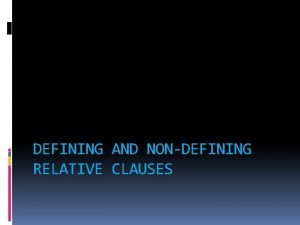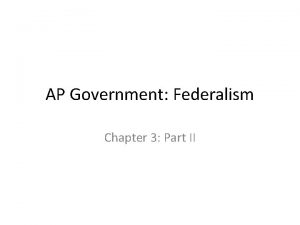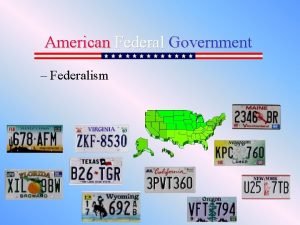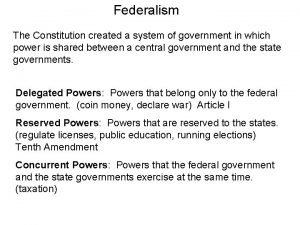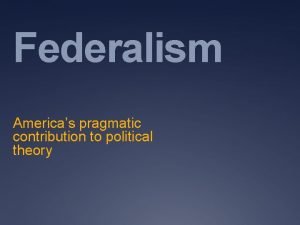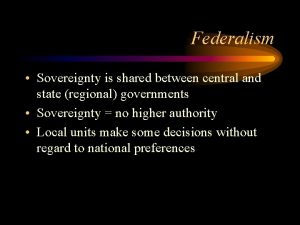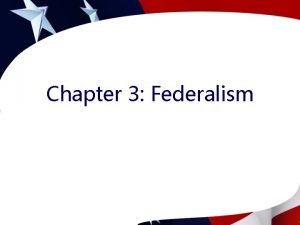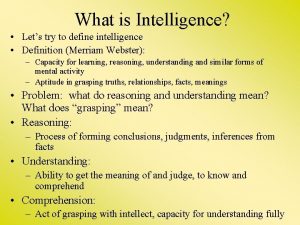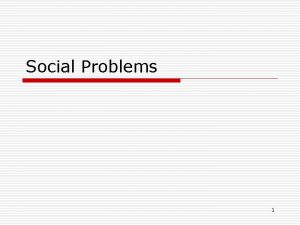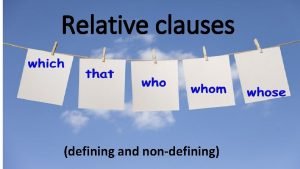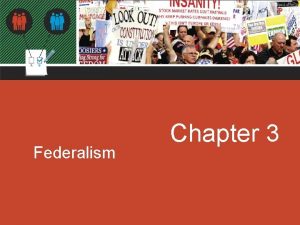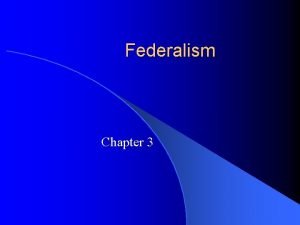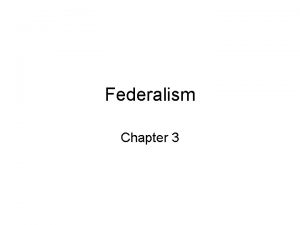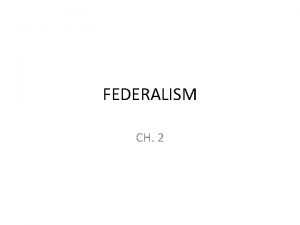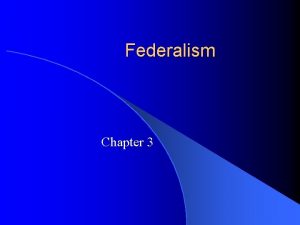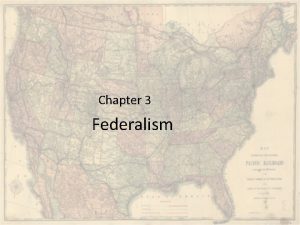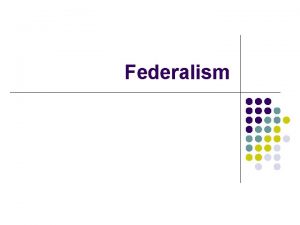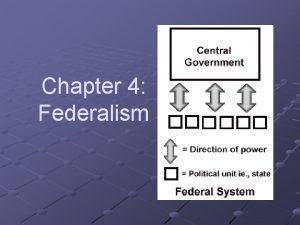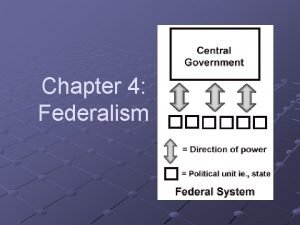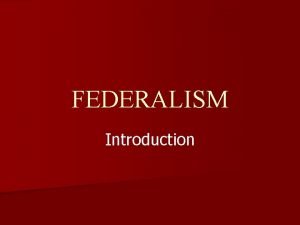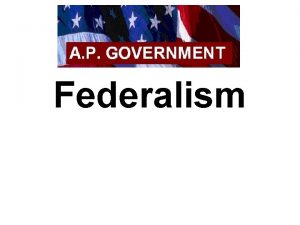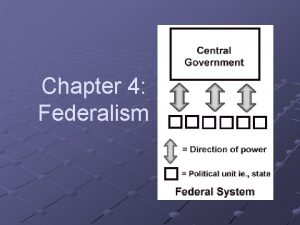Federalism Defining Federalism What is Federalism Definition A






















- Slides: 22

Federalism

Defining Federalism What is Federalism? Definition: A way of organizing a nation so that two or more levels of government have formal authority over the land people. Intergovernmental Relations Definition: The workings of the federal systemthe entire set of interactions among national, state and local governments.

Defining Federalism

Defining Federalism Why is Federalism So Important? Decentralizes More our politics opportunities to participate Decentralizes our policies Which government should take care of which problem? States ways. can solve the same problem in different

The Constitutional Basis of Federalism

The Constitutional Basis of Federalism The Supreme Court is the umpire in the federal system. One of its chief duties is to apply the supremacy clause. The Supremacy Clause shows that the Constitution is most important or most supreme. Mc. Culloch V. Maryland – Supremacy Clause the first major Supreme Court decision to define the relationship between the federal and state governments

The Constitutional Basis of Federalism

Intergovernmental Relations Today Cooperative Federalism “Marble Cake” Federalism Definition: A system of government in which powers and policy assignments are shared between states and the national government. Shared costs Shared administration States follow federal guidelines

Understanding Federalism Advantages for Democracy Increasing access to government Local problems can be solved locally Hard for political parties / interest groups to dominate ALL politics Disadvantages for Democracy States have different levels of service Local interest can counteract national interests Too many levels of government- too much money

Interstate Compacts No State may enter into any treaty, alliance, or confederation. However, the States may, with the consent of Congress, enter into interstate compacts— agreements among themselves and with foreign states. More than 200 compacts are now in force, and range in a variety of uses from sharing lawenforcement data to resource development and conservation.

Full Faith and Credit The Full Faith and Credit Clause of the Constitution ensures that States recognize the laws and, documents, and court proceedings of the other States. There are two exceptions to the clause though: (1) One State cannot enforce another State’s criminal laws. And, (2) Full faith and credit need not be given to certain divorces granted by one State to residents of another State.

Privileges and Immunities The Privileges and Immunities Clause provides that no State can draw unreasonable distinctions between its own residents and those persons who happen to live in other States cannot, for example, pay lower welfare benefits to newly arrived residents than it does to its long-term residents, Saens v. Roe, 1999. However, States can draw reasonable distinctions between its own residents and those of other space, such as charging out-of-State residents higher tuition for State universities than in-State residents.

Extradition is the legal process by which a fugitive from justice in one State is returned to that State. Extradition is upheld through Article IV, Section 2, Clause 2 of the Constitution. • Governors are the State executives that handle the extradition process. • If a governor is unwilling to return a fugitive to a State, federal courts can intervene and order that governor to do so.

Federal Aid Grants of federal money or other resources to the States and/or their cities, counties, and other local units. Schools and colleges, roads and canals, flood control work, etc. $250 billion a year or 25 % of all State and local government spending each year.

The Changing Purpose of Federal Grants to State and Local Governments Copyright © 2013 Cengage

Federal Aid and Federal Control Mandates (Funded & Unfunded) Conditions of Aid John Moore/Getty Images News/Getty Images A National Guardsman watches over the U. S. Mexico border in Arizona. The Guardsmen cannot make arrests but can call the Border Patrol.

A Devolution Revolution? Devolution shifts many federal functions to the states. Most Americans favor devolution, but not if that means cuts in government programs that benefit most citizens. What have been the consequences of devolution?

A Devolution Revolution? Many states have lost budget surpluses and face debts. This leads states to consider which responsibilities are theirs and which belong to the federal government. How will states address their long-term debts?

Congress and Federalism WHY IS THERE SO MUCH POLITICAL AND POLICY DIVERSITY IN THE UNITED STATES? State and local governments have retained certain constitutional protections. Members of Congress think of themselves as representatives of localities to Washington, not as representatives of Washington to the localities.

Intergovernmental Relations Today Fiscal Federalism: The Grant System: Distributing the Federal Pie Federal grants that can be used for specific purposes. They have strings attached. Categorical Project Grants: Based on Population Grants- based on merit Formula Grants: amount varies based on formulas Block Grants: Federal grants given more or less automatically to support broad programs. Grants are given to states & local governments

Intergovernmental Relations Today Fiscal Federalism continued… The Scramble for Federal Dollars $350 billion in grants every year Universalism Unfunded a little something for everybody Mandate the federal government creates programs without providing sufficient funds Problems?

Hurricane Katrina and Federalism
 Non defining relative clauses examples
Non defining relative clauses examples Relative clauses defining and non defining
Relative clauses defining and non defining Non-defining relative clauses
Non-defining relative clauses Defining and non defining relative clauses in telugu
Defining and non defining relative clauses in telugu Non-defining relative clauses cümleleri
Non-defining relative clauses cümleleri Non defining relatives clauses
Non defining relatives clauses Fiscal federalism definition ap gov
Fiscal federalism definition ap gov Intergovernmental relations definition ap gov
Intergovernmental relations definition ap gov Federalism: definition
Federalism: definition Conflicted federalism definition
Conflicted federalism definition Dual federalism definition ap gov
Dual federalism definition ap gov Picket fence federalism definition
Picket fence federalism definition Pragmatic federalism definition
Pragmatic federalism definition Categorical grants
Categorical grants Dual federalism definition
Dual federalism definition Picket fence federalism definition
Picket fence federalism definition Definition of intelligence
Definition of intelligence The defining moment in greek history is the wars
The defining moment in greek history is the wars What are the features of chordates
What are the features of chordates What are social problems
What are social problems Lord capulet defining quotes
Lord capulet defining quotes Lady montague defining quotes
Lady montague defining quotes Non-defining relative clauses as sentence modifiers
Non-defining relative clauses as sentence modifiers


